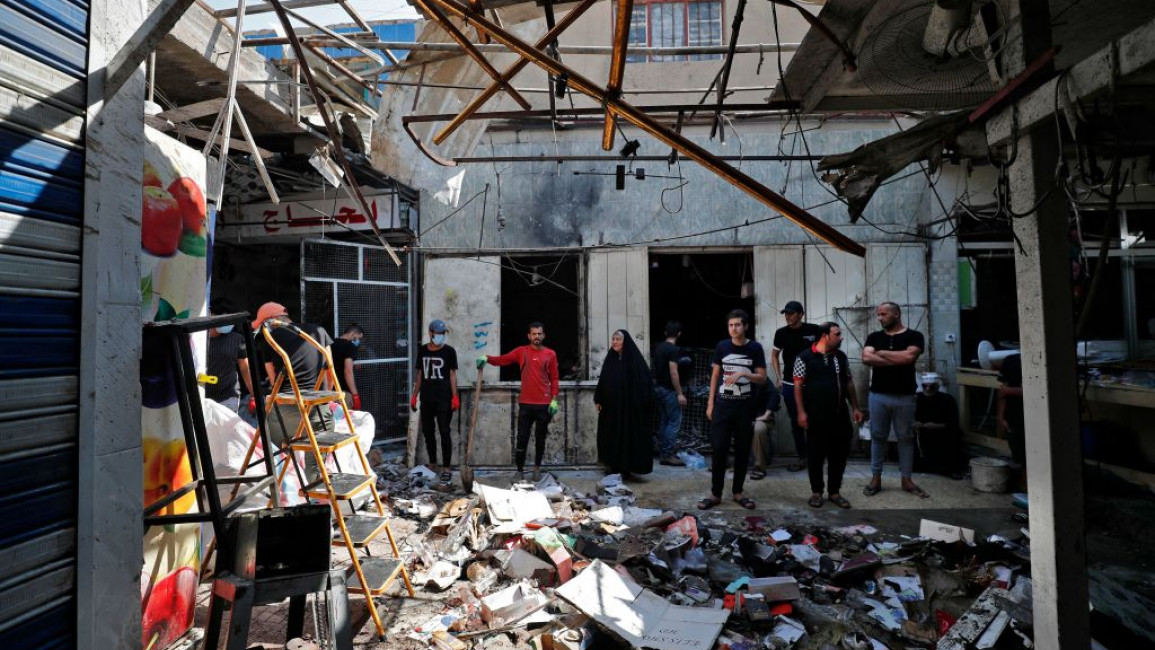'I took them to the market': a Baghdad father's grief
When Emad Jawad dropped his wife and son at a bustling Baghdad market on the eve of the Eid al-Adha festival, he couldn't know he would never see them alive again.
Within half an hour, an Islamic State group suicide bomber detonated an explosives vest there, killing at least 36 people in one of Iraq's deadliest such attacks in years.
The bloody carnage on Monday evening claimed the lives of mostly women and children, including a four-month-old baby, maimed dozens more, and left the war-scarred nation revulsed and bewildered.
The day after, as Muslims marked the Festival of Sacrifice, the devastated father was mourning the violent loss of his loved ones.
"They were so pure, only God knows," said an inconsolable Jawad, dressed in a black tunic, of his wife Hoda, 25, and their eight-year-old son Kayan.
"They will never be replaced, neither him nor his mother."
Another 60 people were wounded at the Al-Woheilat market in the capital's sprawling and poor, mostly Shiite district of Sadr City.
Receiving mourners in a funeral tent, the distraught Jawad, a 41-year-old police officer, recounted the day that changed his life forever.
"I'm the one who dropped them off at around 5:30 pm, and the explosion happened at around 6:00 pm," he told AFP.
"I rushed to the market, searching for them. Then I headed to the hospital and shouted at the morgue workers if Kayan was there, but they didn't know his name. How could they?
"But because he was so strikingly beautiful, I asked if there was a blond boy inside. Sadly, they said yes."
Sitting silently nearby at the funeral was a boy wearing a black baseball cap, Kayan's brother Ali, fighting back tears.
He shot glances at his father as the bereaved man described washing Kayan's corpse, disfigured by shrapnel, and the bloodied remains of his wife, for the burial.
Kayan's grandfather showed photos of his beloved grandchild on his mobile phone.
"We bought him Eid clothes so he could be buried in them," the old man said.
Deadly attacks were common in Baghdad during the sectarian bloodletting that followed the 2003 US-led invasion that toppled Saddam Hussein.
Violence again flared years later as the Sunni extremist group IS swept across much of Iraq and neighbouring Syria.
Iraq declared IS defeated on its territory in late 2017 after a fierce three-year campaign, and attacks became relatively rare in the capital.
But the jihadists still have sleeper cells, and the comparative calm was shattered in January, when a twin suicide bombing claimed by IS killed 32 people in another crowded Baghdad market.
Then came Monday's even deadlier attack.
At the dilapidated Sadr General Hospital, where most victims were taken, Ali Faisal, a young doctor, said many were "dead on arrival", others suffered burns and fractures.
"I myself declared the time of death for two children, a six-year-old and an eight-year-old," he told AFP.
"A four-month-old baby was also killed."
Waiting in the corridor was Nowraz, a 25-year-old woman wearing a face mask against the coronavirus, and a flowing black abaya robe.
She said she was waiting to see her cousin Saberin who survived the blast but was wounded.
Saberin had gone to the market with her 16-year-old daughter Aya and her one-and-a-half-year-old son.
"We didn't know they were at the market," said Nowraz. "She went with Aya and her son to buy clothes for Eid."
The infant boy survived with serious burns, but the teenage girl died.
"She's in a terrible state," Nowraz said of her cousin. "We're afraid to tell her that her daughter is dead."



